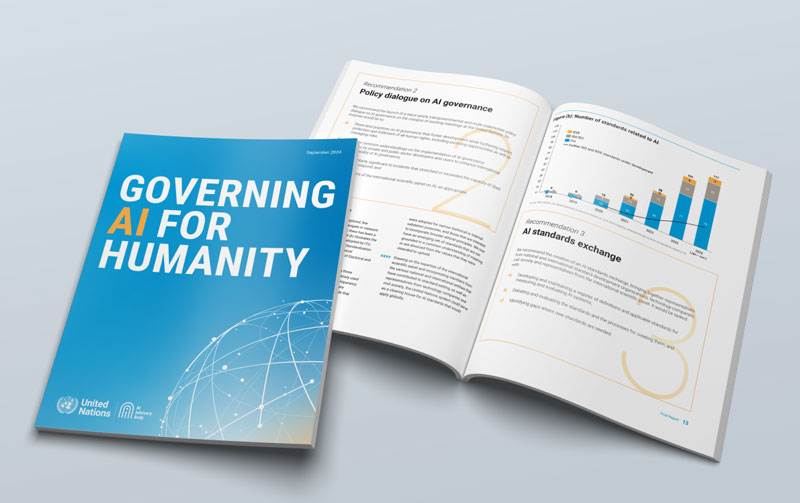The UN Pushes for Global AI Standards | |||
 6,827 6,827  0 0  0 0 | |||
| The United Nations (UN) is actively working on establishing global standards for artificial intelligence (AI). On September 19, 2024, the UN's High-Level Advisory Body on Artificial Intelligence (AIAB) released a report titled "AI Governance for Humanity," outlining seven recommendations for global AI governance. The report argues that the rapid pace of AI development, coupled with its increasing autonomy and lack of transparency, necessitates proactive measures. It emphasizes the need for continuous scientific evaluation and policy dialogue to prevent potential harm worldwide. Established by UN Secretary-General António Guterres in October 2023, the AIAB comprises 39 experts from 33 countries, specializing in technology, law, and data protection. The group's year-long efforts have culminated in a framework for global AI responses. The AIAB identifies "fake news and deepfakes (AI-generated realistic fake content)" as the most significant threats posed by AI. Recognizing that voluntary efforts by companies alone are insufficient, the report calls for a collaborative approach involving diverse stakeholders from around the world to establish binding commitments.
This report is expected to serve as a blueprint for global and national AI regulations and guidelines. The AIAB proposes seven recommendations to manage AI globally: 1. Establishment of an International Science Panel on AI: This panel, supported by the UN, would conduct scientific analyses of AI capabilities, risks, and trends, producing annual reports to address information asymmetry among member states. 2. Formation of Dialogue Platforms: These platforms would facilitate discussions involving AI developers, researchers, and government officials, leveraging insights from the science panel's reports. 3. Development of Standards: Establishing standards, encompassing both technical aspects and less quantifiable factors like fairness and trustworthiness, would ensure effective AI management across borders. 4. Global Standards for Misinformation: Establishing global standards for dealing with false and misleading content would enable the swift removal of problematic information through real-time public-private collaboration. 5. AI Capacity Building Network: Addressing the AI gap between nations, this network would provide education, computing resources, and AI datasets to researchers in developing countries. 6. Global AI Fund: A global fund financed by governments and private companies would support the AI capacity building network. 7. UN AI Secretariat: A small UN secretariat would be responsible for implementing and coordinating these recommendations. Goak-Soo Ko, the sole Korean member of the advisory board and Chairman of the Personal Information Protection Commission, warns that escalating AI risks might necessitate the creation of a more powerful international organization with authority over AI monitoring, reporting, verification, and enforcement.
Tags: AI AI Capacity Building AI Deepfakes AI Development AI Ethics AI Misinformation AI Regulation AI Risks AI Transparency Artificial Intelligence Regulation Global AI Fund Global AI Governance International Science Panel on AI UN AI Secretariat UN AI Standards | |||
| |||
| | |||
|
 1922
1922 